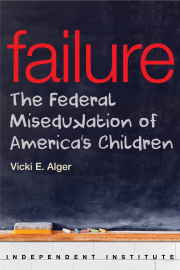OAKLAND, Calif.—A portrait of stagnation! That’s how U.S. Secretary of Education Arne Duncan summarized the performance of American 15-year-old students, who slipped in the latest international rankings in reading, math and science.
This wasn’t supposed to happen with a U.S. Department of Education.
At the Oct, 17, 1979, Department of Education Organization Act signing ceremony, President Jimmy Carter insisted that he had come to office “determined” to improve the return on Americans’ education investment.
“I don’t know what history will show, but my guess is that the best move...might very well be this establishment of this new Department of Education,” he remarked at the time.
History has proved Carter wrong, since overall student performance is no better today with a federal Education Department than it was decades ago without one. But we’re sure a lot poorer in the pocketbook.
Results on the Nation’s Report Card for 9-year-olds, 13-year-olds and 17-year-olds in reading, math and science have virtually flat-lined since the early 1970s—even though total public school funding more than doubled in real terms since then—increasing nearly $400 billion, while student enrollment has grown less than 10 percent.
Opponents predicted such failure when the original Department of Education was established—in 1867.
Back then opponents objected that the federal government just isn’t qualified to manage education, so creating a centralized bureaucracy filled with clerks who can’t teach a single student the A-B-C’s was derided as a useless extravagance.
After being downgraded to relative obscurity as the Office of Education in 1888, plans for resurrecting the department emerged during the Carter administration—largely at the behest of the country’s largest teachers union, the National Education Association.
Twentieth-century opponents from both sides of the aisle again derided the notion that the feds or special interest groups know what’s best for schoolchildren. Supporters also couldn’t provide a shred of evidence that student achievement would improve under federal “leadership.”
Rather than waiting around a few more decades for some elusive federal know-how to miraculously kick in, we should turn to the states for evidence of actual academic improvement, particularly among disadvantaged students.
This year, nearly 245,000 students are attending schools that their parents have chosen for them through 32 voucher and tax-credit scholarship programs operating in 16 states and the District of Columbia, as well as one educational savings account program in Arizona. Scientific research consistently shows that participating students have higher graduation and college attendance rates, as well as higher reading and math scores than their peers.
These are compelling findings because students participating in parental choice programs are overwhelmingly from low-income families and previously had attended failing schools.
The reason choice programs succeed where multi-billion dollar federal Department of Education programs fail is simple. Parents are the real education experts. Unlike far-off federal politicians and bureaucrats, parents have only one special interest—their children.
Parents empowered to enroll their children in schools they think are best—regardless of their income or address—introduce immediate rewards for schools that perform well and unwelcome consequences for those that don’t.
When schools have to compete for students, all children win—not just those participating in parental choice programs. More than 200 scientific analyses show beneficial effects of competition on public schools, including higher student achievement, graduation rates, efficiency, teacher salaries and smaller class sizes.
Nowhere does the word “education” appear in the Constitution. In fact, “powers not delegated to the United States by the Constitution, nor prohibited by it to the States, are reserved to the States respectively, or to the people,” according to the 10th Amendment.
Nowadays the very notion of denying the federal government any unenumerated power is almost unthinkable. Yet, given the federal government’s track record, the Framers of the Constitution were right to make the primacy of states and local citizens over education the supreme law of the land.









